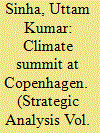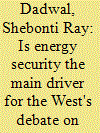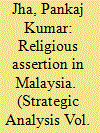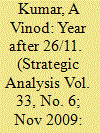| Srl | Item |
| 1 |
ID:
091387


|
|
|
|
|
| Publication |
2009.
|
| Summary/Abstract |
Climate change is hugely challenging. But there is an unmistakable straighforwardness to it reduce emissions to reduce global warming. In many ways, this reflects the sum total of the paradoxes that define our reality and the contradictions and hypocricy of coping and dealing with it.
|
|
|
|
|
|
|
|
|
|
|
|
|
|
|
|
| 2 |
ID:
091391


|
|
|
|
|
| Publication |
2009.
|
| Summary/Abstract |
The May 2009 White paper is an important policy document on the future posture and plans of Australian defence and strategic policy, it is riddled with contradictions. While it does look ahead, it is nuclear what its immediate challenges are. Moreover, it fails to identify its likely adversaries and equally fails to fustify the huge military programme.
|
|
|
|
|
|
|
|
|
|
|
|
|
|
|
|
| 3 |
ID:
091392


|
|
|
|
|
| Publication |
2009.
|
| Summary/Abstract |
'One man's terrorist is another's liberation fighter.' The LTTE was a symptom of a problem and sustainable peace needs to be based on addressing the root causes of the conflict that gave birth to the group. Most post-colonial nation-states in South and Southeast Asia - India, Pakistan, Bangladesh, Indonesia, Malaysia, and Singapore - have experienced 'ethnic' riots and problems related to the rights of minorities and identity politics. Balancing the expectation of majority and minority groups has been a post-colonial challenge for all. Sri Lanka too experienced ethnic riots in the post-colonial period - 1956, 1977, and 1983 - where the Tamil minority was targeted
|
|
|
|
|
|
|
|
|
|
|
|
|
|
|
|
| 4 |
ID:
091393


|
|
|
|
|
| Publication |
2009.
|
| Summary/Abstract |
This article would have benefited from a more comprehensive examination of some of the policies introduced by the S.W.R.D. Bandaranaike government five decades ago and their continuance by successor administrations intent on appeasing those who regard Sri Lanka as a Buddhist (i.e. Sinhala) nation, in particular the country's influential Buddhist clergy. The personal linkages between the monks and the military have led to the Sri Lankan forces seeing themselves not as an ethnically neutral and professional force, but as the sword protecting the country's (very distinguished) Buddhist heritage. A closer examination of the roots of such a majoritarian attitude is needed in order to understand how Velupillai Prabhakaran became the force he evolved into, projecting himself as the sword of Tamil resistance to Sinhala domination. Both Sinhala zealots as well as the LTTE, therefore, nourished each other's support base.
|
|
|
|
|
|
|
|
|
|
|
|
|
|
|
|
| 5 |
ID:
091394


|
|
|
|
|
| Publication |
2009.
|
| Summary/Abstract |
There is much to engage with Darini Rajasingham's substantial yet succinct account of Sri Lanka's past, present, and future, 'From National Security to Human Security: The Challenge of Winning Peace in Sri Lanka'. While I am in agreement with many of her statements and claims, I shall try to elaborate on some of the unaddressed social, historical, and political processes that might deepen our insights into the subject at hand.
|
|
|
|
|
|
|
|
|
|
|
|
|
|
|
|
| 6 |
ID:
091395


|
|
|
|
|
| Publication |
2009.
|
| Summary/Abstract |
Though global warming and climate change is a real concern and needs to be addressed, it is concerns over energy security that are driving the West's policy and debate on climate change. With the traditional oil and gas market changing in favour of the developing countries, the developed countries are concerned about retaining their preferential access to energy resources. Consequently, they are applying pressure on the emerging economies to cut down on consumption of fossil fuels on the grounds of reducing carbon emissions, whereas their own energy policies indicate that their dependence on fossil fuels, including coal, will continue.
|
|
|
|
|
|
|
|
|
|
|
|
|
|
|
|
| 7 |
ID:
091389


|
|
|
|
|
| Publication |
2009.
|
| Summary/Abstract |
The February 2009 Swat deal between the Taliban and the Pakistan Government, the current Pakistani Army offensive against Taliban strongholds in various areas of Federally Administered Triabal Tribal Areas (FATA) and the North West Frontier Province (NWFP), and the Talibani response to those operations through terror attacks in various Pakistani cities, sharply underline the clear and present threat to Pakistan.
|
|
|
|
|
|
|
|
|
|
|
|
|
|
|
|
| 8 |
ID:
091390


|
|
|
|
|
| Publication |
2009.
|
| Summary/Abstract |
In domestic terms Japan's Atomic Energy Basic Law of 1955 stipulates that nuclear activities can be undertaken only for peaceful purposes. In 1967, Japan declared the Three non-nuclear principles expressing the policy of not possessing, not producing and not permitting the introduction of nuclear weapons into Japan.
|
|
|
|
|
|
|
|
|
|
|
|
|
|
|
|
| 9 |
ID:
091415


|
|
|
|
|
| Publication |
2009.
|
| Summary/Abstract |
In recent years India, along with China and the Association of Southeast Asian Nations, has been following a policy of diplomatic engagement with Myanmar. India has also clarified its diplomatic stand that such a policy engagement will positively serve its national interests. Thus, its present policy is guided to serve its own interests having relevance to its North-Eastern region, to counterbalance the increasing Chinese influence in Myanmar, to address the deteriorating security conditions, to check the growth of drug trafficking, and to take advantage of the emerging possibilities of its 'Look East Policy'.
|
|
|
|
|
|
|
|
|
|
|
|
|
|
|
|
| 10 |
ID:
091397


|
|
|
|
|
| Publication |
2009.
|
| Summary/Abstract |
In order to construct an operational nuclear device, terrorists need to obtain the requisite fissile materials - Highly Enriched Uranium (HEU) or plutonium. It has been proved that, generally, it is much simpler to devise a crude nuclear bomb with HEU than with plutonium. Hence, terrorists can have 'reasonable confidence' in the performance of weapons-grade HEU bombs. The magnitude of the threat of nuclear terrorism from Pakistan's HEU-based nuclear weapons programme is assuming alarming proportions. However, adequate preventive steps can be taken to minimize the danger.
|
|
|
|
|
|
|
|
|
|
|
|
|
|
|
|
| 11 |
ID:
091416


|
|
|
|
|
| Publication |
2009.
|
| Summary/Abstract |
For several decades, religion has been a visible and potent force in the domestic politics of Muslim countries. Within Asia, the issue has attracted considerable debate and a good case study of this is Malaysia. Issues of religious conversion, demolition of temples, apostasy, and Islamic state discourse have widened fault lines among different religious communities in Malaysia. While on the one hand the role of the state is seen as being a constraining factor to these divisive tendencies, on the other hand politico-social compulsions have coerced it into acceding to the majoritarian demands. The opposition Islamic political parties and the contradicting interpretations of the constitution and religious texts have aggravated the problem. The global financial crisis has further accentuated the fissures and minority protagonists of majority religious groups have become more assertive.
|
|
|
|
|
|
|
|
|
|
|
|
|
|
|
|
| 12 |
ID:
091417


|
|
|
|
|
| Publication |
2009.
|
| Summary/Abstract |
This article deals with financing of Islamist terror in Bangladesh, which on occasions becomes jihadi in nature, especially when it is directed towards India. The exercise undertaken studies developments in the area of terrorist finance in Bangladesh post-9/11, but does not claim to fully estimate the volume of terror financing in that country. The attempt has been made to throw some light on an area where little research has been done. The article argues that the Government of Bangladesh has shown a half-hearted approach towards checking the finance of terrorism. Attempts to obfuscate the issue, together with a lack of adequate machinery and competent staff, has made the existing law ineffective.
|
|
|
|
|
|
|
|
|
|
|
|
|
|
|
|
| 13 |
ID:
091396


|
|
|
|
|
| Publication |
2009.
|
| Summary/Abstract |
Militaries the world over need to study and understand lessons from the ongoing military operations in Afghanistan, Iraq, and Lebanon, and the new knowledge needs to be placed in context. Neglected military history itself provides enduring lessons. This article attempts to capture the trends and debates in the understanding of current warfare and outlines how lessons of war are interpreted with a focus on future trends in war-fighting. The article concludes with some policy suggestions and areas for further inquiry.
|
|
|
|
|
|
|
|
|
|
|
|
|
|
|
|
| 14 |
ID:
091388


|
|
|
|
|
| Publication |
2009.
|
| Summary/Abstract |
Why are the two largest democracies - India and the United States - starkly different when it comes to tackling terrorism? The answer to this perplexing question could lie in the two countries divergent approach to security and management of national security resources. Equally relevant is the variance in their political resoluteness in exercising suitable responses to emergent threats.
|
|
|
|
|
|
|
|
|
|
|
|
|
|
|
|